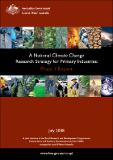| Date Accessioned | 2013-10-15 |
| Date Available | 2013-10-15 |
| Issued | 2008 |
| Identifier | http://hdl.handle.net/11079/12646 |
| Abstract | Australia’s primary industries are projected to be significantly affected by climate change. The
changes in climate over the next few decades will be substantial, but the effects will vary across
the country. Some regions will experience average warming of up to 1.8ºC by 2030; in other areas
average rainfall will decrease as much as 40 per cent by 2070 (compared to 1990). These impacts
must be understood to minimise risk and maximise opportunities. |
| Abstract | Australian and international policies, programs and market expectations in response to climate
change will also affect primary industries. For example, primary industries contribute an estimated
22 per cent of Australia’s total greenhouse gas emissions and will need to reduce these emissions
or provide valuable offsets in response to both government policy and market demands. However,
the primary industries have a strong history of adaptation and change to overcome threats and take
advantage of new opportunities. |
| Abstract | The development of this strategy has been funded by all 15 rural Research and Development
Corporations (RDCs) (through the Council of Chairs), CSIRO, all state and territory governments
and the Commonwealth Government (through the Primary Industries Standing Committee
Research and Development Subcommittee). The research strategy identifies areas for industry and
government collaboration, and will be used as a guide for developing more specific research and
development plans by a number of Australian government, research and industry stakeholders. |
| Abstract | The parties to this initiative recognise that Australia’s collective capacity in climate change research
needs to be harnessed in a nationally coordinated effort if the nation’s primary industries are to be
adequately and rapidly equipped to reduce greenhouse gas emissions and adapt to climate change.
Land & Water Australia has managed the development of this strategy for the partners, consulting
widely with expert reference groups, the public (through submissions), relevant agencies and
research providers. It has commissioned specific reports on climate change impacts and adaptation
and emissions trading, and assessed existing research activity across the nation. The level of input and
support for the process has exceeded expectations, demonstrating the interest in this important
subject and the need for such a strategy and its subsequent implementation. |
| Abstract | This research strategy establishes a foundation upon which sector specific and cross-sector research
programs can be developed. It recognises the considerable amount of existing research and the gaps
in knowledge, identifies the importance of predicting climate change and its impacts, and highlights
opportunities for primary producers to adapt to a changing climate and reduce greenhouse gas
emissions. The strategy also recognises the need to link with and build upon related research and
program activity already in place. |
| Language | en |
| Publisher | Land and Water Australia |
| Part of Series | Internal Report; 2008 LWA002 |
| Subject | Climate change |
| Subject | Greenhouse emissions |
| Subject | Research and Development Corporations |
| Subject | RDC |
| Subject | Climate adaptation |
| Subject | Farming systems |
| Subject | Production management |
| Title | A national climate change research strategy for primary industries |

